外研英语九年级下册课件Module4 Unit 2 We must keep the camp clean. (共21张PPT无素材)
文档属性
| 名称 | 外研英语九年级下册课件Module4 Unit 2 We must keep the camp clean. (共21张PPT无素材) |  | |
| 格式 | zip | ||
| 文件大小 | 3.1MB | ||
| 资源类型 | 教案 | ||
| 版本资源 | 外研版 | ||
| 科目 | 英语 | ||
| 更新时间 | 2020-04-01 18:33:40 | ||
图片预览

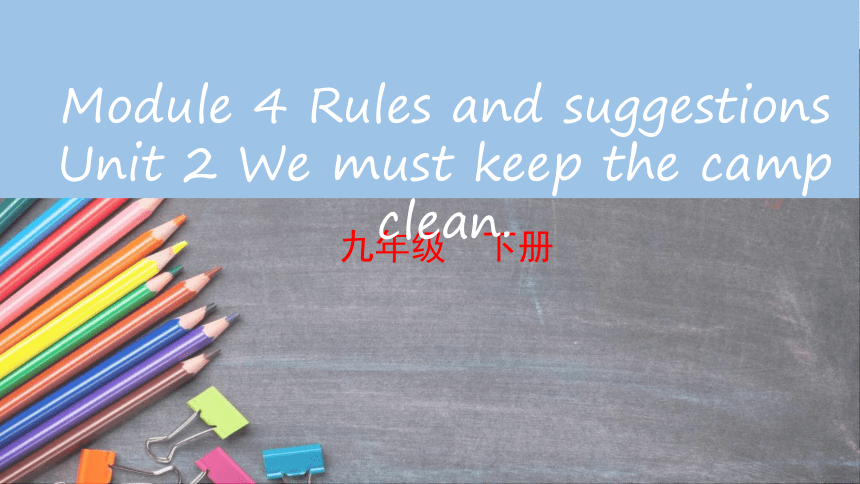
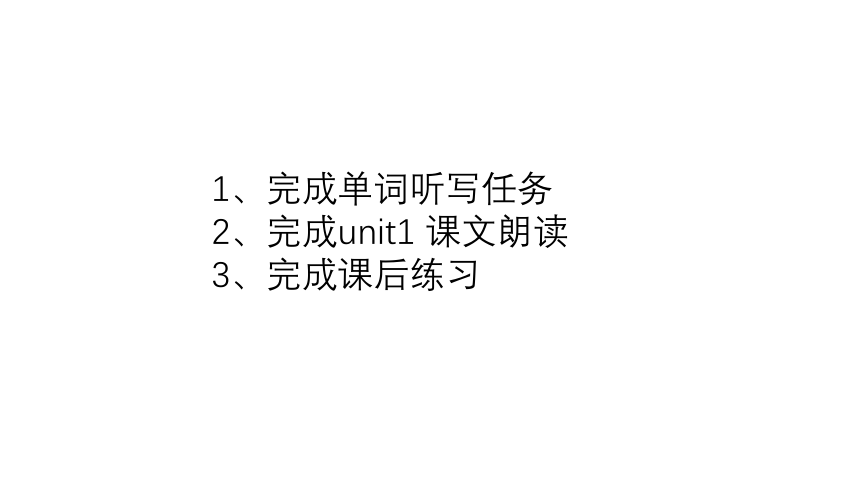

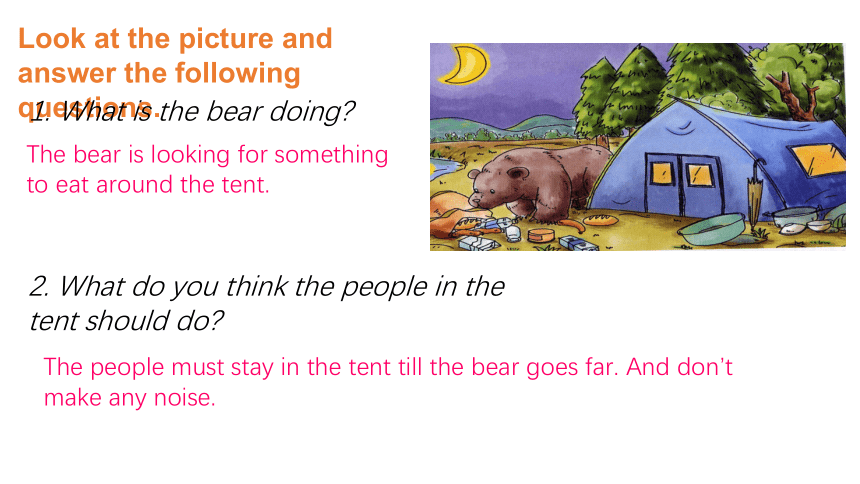

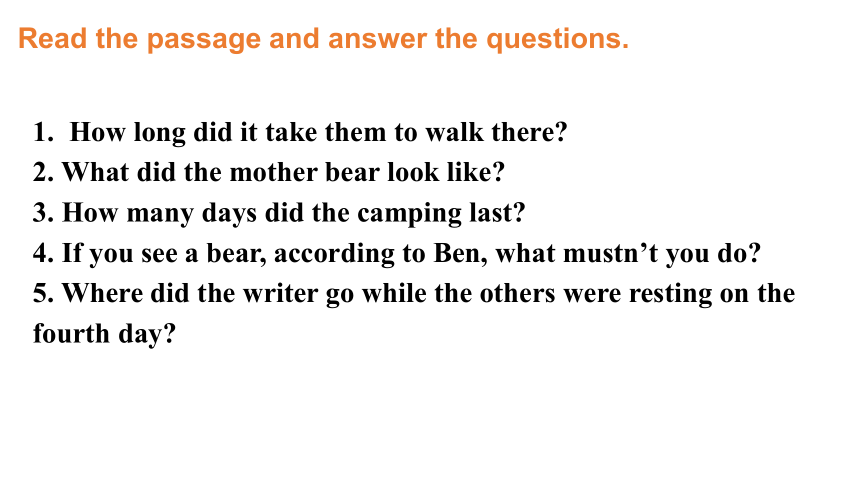
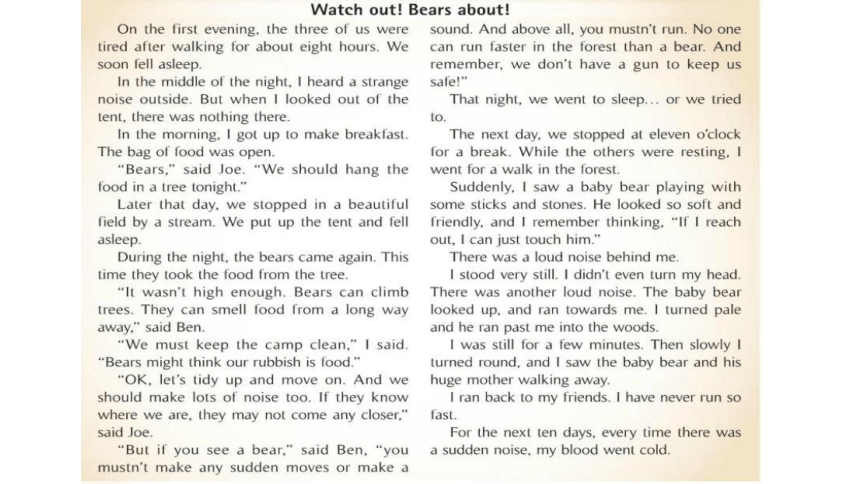
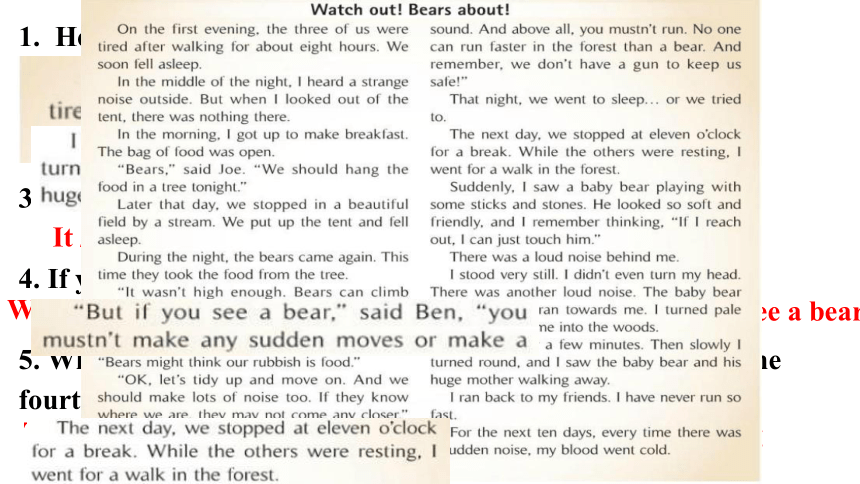
文档简介
(共21张PPT)
科
九年级 下册
Module 4 Rules and suggestions
Unit 2 We must keep the camp clean.
1、完成单词听写任务
2、完成unit1 课文朗读
3、完成课后练习
Have you ever seen bears? Are you afraid of them?
Do you know what you should do when you see a bear?
Lead-in
Look at the picture and answer the following questions.
1. What is the bear doing?
2. What do you think the people in the tent should do?
The bear is looking for something to eat around the tent.
The people must stay in the tent till the bear goes far. And don’t make any noise.
Read the passage and answer the questions.
How long did it take them to walk there?
2. What did the mother bear look like?
3. How many days did the camping last?
4. If you see a bear, according to Ben, what mustn’t you do?
5. Where did the writer go while the others were resting on the fourth day?
How long did it take them to walk there?
2. What did the mother bear look like?
3. How many days did the camping last?
4. If you see a bear, according to Ben, what mustn’t you do?
5. Where did the writer go while the others were resting on the fourth day?
It
It/ The mother
It / The camping
We mustn’t
The writer
took them
about eight hours
to walk there.
is huge.
lasted
14 days.
make any sudden moves or make a sound if we see a bear.
went to the forest
while the others were resting on the fourth day.
The writer and his friends went camping. On the first evening they 1. _________asleep soon because they were tired. At midnight,he heard a strange noise and looked out of the 2. _________,but nothing was there. The next morning they found the bag open and they decided to 3. _________the food in the tree. The bears came again and took away the food from the tree. They realized that they should tidy up the camp. When they saw a bear,they mustn’t make any 4._________ moves, make a sound or run because they didn’t have a 5. _________ to keep themselves safe. On the third day,when the writer saw a baby bear in the 6. _________ , it looked so 7. _________that he wanted to reach out for it. Just at that time, a loud noise made him stand 8. _________and his 9. _________went cold. It was a huge mother bear. He ran back as 10. _________as he could and the mother bear walked away.
fell
tent
hang
sudden
gun
forest
soft
still
blood
fast
Read the passage again and fill in the blanks.
1,小心,提防
2,入睡
3,在…的中间
4,向外看
5,在小溪边
6,收拾整理
7,继续前进
8,发出声响
9,首先,尤其是
10,看见某人正在做某事
11,伸手
12,站立不动
13,转头
14,变得苍白
15,走开离开
16,每次…每当….
see sb. doing
1,小心,提防
2,入睡
3,在…的中间
4,向外看
5,在小溪边
6,收拾整理
7,继续前进
8,发出声响
9,首先,尤其是
10,看见某人正在做某事
11,伸手
12,站立不动
13,转头
14,变得苍白
15,走开离开
16,每次…每当….
1,watch out
2,fall asleep
3,in the middle of
4,look out of
5,by a stream
6,tidy up
7,move on
8,make a sound
9,above all
10,see sb doing sth
11,reach out
12,stand still
13,turn one’s head
14,turn pale
15,walk away
16,every time
1. We soon fell asleep. 我们很快就睡着了。
fall asleep意为“入睡;睡着”,是系表结构的短语。其中fall用作连系动词,意为“变成,进入(某种状态)”。
? He was so tired that he fell asleep in the car.
他太累了,在汽车里睡着了。
辨析fall asleep,be asleep,go to sleep与go to bed
fall asleep意为“入睡”,表示动作,侧重于“自然而然地入睡”,有时指无意之中或在不适当的场合睡着。 My father fell asleep on the sofa.我爸爸在沙发上睡着了。
be asleep意为“睡着的”,表示一种状态,可以和表示一段时间的状语连用。 The child has been asleep for two hours.这个孩子已经睡了两个小时了。
go to sleep意为“睡着;入睡”,表示从清醒到渐渐睡着这一过程,强调进入睡眠状态。 He always goes to sleep at eleven every night.每天晚上他总是十一点钟入睡。
go to bed表示“上床睡觉”,强调上床睡觉这个动作,无“睡着”之意,它的对应词组是get up“起床”。 We went to bed at nine and fell asleep at ten.
我们九点钟上床睡觉,十点钟入睡。
2. We should hang the food in a tree tonight. 今天晚上我们应该把食物挂在树上。
(无锡中考)
春节前红灯笼经常被沿街悬挂。
Red lanterns are often ______ (hang) along the streets before Spring Festival.
点拨:分析句子结构并结合句意可判断出,本句为一般现在时的被动语态,所以应该用hang的过去分词。hang表示“悬挂”之意时,过去分词为不规则变化,故填hung。
3. We put up the tent and fell asleep. 我们搭起帐篷入睡了。
put up意为“搭起;盖起”,是“动词+副词”结构的短语,代词作宾语时,必须放在put与up之间。
?They?put?up?a?new?house?over there.??
??他们在那边盖了一栋新房子。
?I bring a tent. Can you help me to put it up?
我带来一个帐篷,你能帮我搭起它吗?
【拓展】
put up还可以意为“举起;张贴”
?Jim put up his hand to ask a question. 吉姆举手问了一个问题。
?They put up a map on the wall. 他们在墙上贴了一幅地图。
4. He looked so soft and friendly, and I remember thinking, “If I reach out, I can just touch him.” 它看起来那么柔软、那么友好,我现在还记得当时在想:“我要是伸出手的话,就能摸到它。”
reach out意为“伸出”,其后常与介词to连用,表示“接触;向(某人)提供援助”。
? She reached out her hand and took the money away.她伸出手将钱拿走。
? We should reach out to the poor children.
我们应该向贫穷的孩子们伸出援助之手。
【拓展】
reach out for sth.意为“伸手拿某物”。
? The little boy is trying to reach out for a book.
这个小男孩正在努力伸手够一本书。
5. I stood very still. 我一动不动地站着。
still形容词,意为“静止的;不动的”,指平和、安静的状态。
? Keep still while I tie your shoe. 别动,我给你系鞋带。
? All the still water mirrors the cloudy sky. 大片的静水映出多云的天空。
【拓展】
?still作副词,意为“仍然;还是”,此时常用于although/though引导的让步状语从句中。
? I still live in the city now. 我现在仍然住在这个城市。
? Although Jack was a little tired, he still went on with his work.
尽管杰克有点累,但他仍然继续工作。
?still作副词,还可以用来修饰比较级。
? She is still more beautiful now. 她现在更加漂亮了。
科
九年级 下册
Module 4 Rules and suggestions
Unit 2 We must keep the camp clean.
1、完成单词听写任务
2、完成unit1 课文朗读
3、完成课后练习
Have you ever seen bears? Are you afraid of them?
Do you know what you should do when you see a bear?
Lead-in
Look at the picture and answer the following questions.
1. What is the bear doing?
2. What do you think the people in the tent should do?
The bear is looking for something to eat around the tent.
The people must stay in the tent till the bear goes far. And don’t make any noise.
Read the passage and answer the questions.
How long did it take them to walk there?
2. What did the mother bear look like?
3. How many days did the camping last?
4. If you see a bear, according to Ben, what mustn’t you do?
5. Where did the writer go while the others were resting on the fourth day?
How long did it take them to walk there?
2. What did the mother bear look like?
3. How many days did the camping last?
4. If you see a bear, according to Ben, what mustn’t you do?
5. Where did the writer go while the others were resting on the fourth day?
It
It/ The mother
It / The camping
We mustn’t
The writer
took them
about eight hours
to walk there.
is huge.
lasted
14 days.
make any sudden moves or make a sound if we see a bear.
went to the forest
while the others were resting on the fourth day.
The writer and his friends went camping. On the first evening they 1. _________asleep soon because they were tired. At midnight,he heard a strange noise and looked out of the 2. _________,but nothing was there. The next morning they found the bag open and they decided to 3. _________the food in the tree. The bears came again and took away the food from the tree. They realized that they should tidy up the camp. When they saw a bear,they mustn’t make any 4._________ moves, make a sound or run because they didn’t have a 5. _________ to keep themselves safe. On the third day,when the writer saw a baby bear in the 6. _________ , it looked so 7. _________that he wanted to reach out for it. Just at that time, a loud noise made him stand 8. _________and his 9. _________went cold. It was a huge mother bear. He ran back as 10. _________as he could and the mother bear walked away.
fell
tent
hang
sudden
gun
forest
soft
still
blood
fast
Read the passage again and fill in the blanks.
1,小心,提防
2,入睡
3,在…的中间
4,向外看
5,在小溪边
6,收拾整理
7,继续前进
8,发出声响
9,首先,尤其是
10,看见某人正在做某事
11,伸手
12,站立不动
13,转头
14,变得苍白
15,走开离开
16,每次…每当….
see sb. doing
1,小心,提防
2,入睡
3,在…的中间
4,向外看
5,在小溪边
6,收拾整理
7,继续前进
8,发出声响
9,首先,尤其是
10,看见某人正在做某事
11,伸手
12,站立不动
13,转头
14,变得苍白
15,走开离开
16,每次…每当….
1,watch out
2,fall asleep
3,in the middle of
4,look out of
5,by a stream
6,tidy up
7,move on
8,make a sound
9,above all
10,see sb doing sth
11,reach out
12,stand still
13,turn one’s head
14,turn pale
15,walk away
16,every time
1. We soon fell asleep. 我们很快就睡着了。
fall asleep意为“入睡;睡着”,是系表结构的短语。其中fall用作连系动词,意为“变成,进入(某种状态)”。
? He was so tired that he fell asleep in the car.
他太累了,在汽车里睡着了。
辨析fall asleep,be asleep,go to sleep与go to bed
fall asleep意为“入睡”,表示动作,侧重于“自然而然地入睡”,有时指无意之中或在不适当的场合睡着。 My father fell asleep on the sofa.我爸爸在沙发上睡着了。
be asleep意为“睡着的”,表示一种状态,可以和表示一段时间的状语连用。 The child has been asleep for two hours.这个孩子已经睡了两个小时了。
go to sleep意为“睡着;入睡”,表示从清醒到渐渐睡着这一过程,强调进入睡眠状态。 He always goes to sleep at eleven every night.每天晚上他总是十一点钟入睡。
go to bed表示“上床睡觉”,强调上床睡觉这个动作,无“睡着”之意,它的对应词组是get up“起床”。 We went to bed at nine and fell asleep at ten.
我们九点钟上床睡觉,十点钟入睡。
2. We should hang the food in a tree tonight. 今天晚上我们应该把食物挂在树上。
(无锡中考)
春节前红灯笼经常被沿街悬挂。
Red lanterns are often ______ (hang) along the streets before Spring Festival.
点拨:分析句子结构并结合句意可判断出,本句为一般现在时的被动语态,所以应该用hang的过去分词。hang表示“悬挂”之意时,过去分词为不规则变化,故填hung。
3. We put up the tent and fell asleep. 我们搭起帐篷入睡了。
put up意为“搭起;盖起”,是“动词+副词”结构的短语,代词作宾语时,必须放在put与up之间。
?They?put?up?a?new?house?over there.??
??他们在那边盖了一栋新房子。
?I bring a tent. Can you help me to put it up?
我带来一个帐篷,你能帮我搭起它吗?
【拓展】
put up还可以意为“举起;张贴”
?Jim put up his hand to ask a question. 吉姆举手问了一个问题。
?They put up a map on the wall. 他们在墙上贴了一幅地图。
4. He looked so soft and friendly, and I remember thinking, “If I reach out, I can just touch him.” 它看起来那么柔软、那么友好,我现在还记得当时在想:“我要是伸出手的话,就能摸到它。”
reach out意为“伸出”,其后常与介词to连用,表示“接触;向(某人)提供援助”。
? She reached out her hand and took the money away.她伸出手将钱拿走。
? We should reach out to the poor children.
我们应该向贫穷的孩子们伸出援助之手。
【拓展】
reach out for sth.意为“伸手拿某物”。
? The little boy is trying to reach out for a book.
这个小男孩正在努力伸手够一本书。
5. I stood very still. 我一动不动地站着。
still形容词,意为“静止的;不动的”,指平和、安静的状态。
? Keep still while I tie your shoe. 别动,我给你系鞋带。
? All the still water mirrors the cloudy sky. 大片的静水映出多云的天空。
【拓展】
?still作副词,意为“仍然;还是”,此时常用于although/though引导的让步状语从句中。
? I still live in the city now. 我现在仍然住在这个城市。
? Although Jack was a little tired, he still went on with his work.
尽管杰克有点累,但他仍然继续工作。
?still作副词,还可以用来修饰比较级。
? She is still more beautiful now. 她现在更加漂亮了。
同课章节目录
- Module 1 Travel
- Unit 1 We toured the city by bus and by taxi
- Unit 2 It's a long story.
- Unit 3 Language in use
- Module 2 Education
- Unit 1 They don't sit in rows.
- Unit 2 What do I like best about school?
- Unit 3 Language in use
- Module 3 Life now and then
- Unit 1 They sometimes work harder.
- Unit 2 I think life is better today.
- Unit 3 Language in use.
- Module 4 Rules and suggestions
- Unit 1 You must be careful of falling stones.
- Unit 2 we must keep the camp clean.
- Unit 3 Language in use.
- Revison A
- Module 5 Look after yourself
- Unit 1 We'd better get you to hospital.
- Unit 2 Get off the sofa!
- Unit 3 Language in use.
- Module 6 Eating togethe
- Unit 1 When is the school-leavers' party?
- Unit 2 Knives and forks are used for most Western
- Unit 3 Language in use
- Module 7 English for you and me
- Unit 1 Have you ever been to an English corner?
- Unit 2 We all own English.
- Unit 3 Language in use
- Module 8 My future life
- Unit 1 Here's to our friendship and the future
- Unit 2 I know that you will be better at maths.
- Unit 3 Language in use
- Revison B
